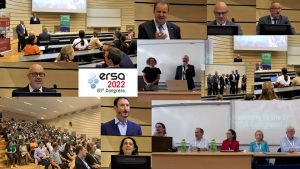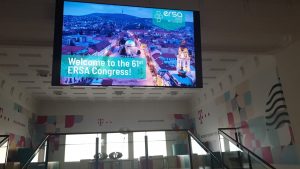Egész héten zajlott a 61. ERSA (European Regional Science Association) kongresszus Pécsen.
Az ELKH KRTK Regionális Kutatások Intézete a PTE Közgazdaságtudományi Karral és a Magyar Regionális Tudományi Társasággal közösen helyi társszervezője a rendezvénynek.
Kollégáink, Gál Zoltán a helyi szervezőbizottság társelnöke, Balázs Páger pedig a bizottság titkára.
A kongresszuson körülbelül 400 személyes jelenlétű és 314 online előadás hangzik el közel 40 tématerület szekcióiban, illetve számos tematikus szekcióban.
A Regionális Kutatások Intézete kutatói az alábbi előadásokkal szerepeltek:

Balogh Péter: Geopolitical imaginaries in the Hungarian-Ukrainian borderland
Baranyai Nóra: Ethnoregional communities and their political representation in Central and Eastern Europe
Baranyai Nóra – Barsi Boglárka – Brucker Balázs – Finta István – Kovács Katalin – Pálné Kovács Ilona: Left Alone: Hungarian Local Governments during Covid-19 Pandemic
Barsi Boglárka: Adaptation of smart city modell(s) in rural environment (how to interpret smartness in less development regions)
Berkes Judit: Highly qualified social strata in urban areas of Hungarian regional centres from 1980 to 2011
Berkes Judit – Rácz Szilárd: Firm geography analyses in Central and Southeastern Europe
Egyed Ildikó: Contemporary trends in European industrial policy: from global interdependencies to more economic sovereignty and autonomy?
Finta István: Partnership and MLG in the practice of the EU Commission in the light of a specific case
Füzér Katalin – Szerb László – Erát Dávid – Völgyi Bence – Horeczki Réka: Global social capital inequalities in the context of the digital divides
Gál Zoltán – Gyimesi András: Does Foreign Direct Investment generate regional economic growth? The case of Emerging Europe
Gibárti Sára: A peripheric centre: the evolving urban development concepts of the city of Pécs
Grünhut Zoltán – Bodor Ákos: The Cosmopolitan Europe: Desire or Threat? East European Perspectives
Hajdú Zoltán: Tokaj wine region: state border separation (1920) and decision of EU Court of Justice about „two Tokajs” (2014)
Hardi Tamás: Landscape fragmentation types caused by urban sprawl in surrounding zones of Central European regional centres
Horeczki Réka – Pálné Kovács Ilona: Governance challenges in peripheral areas in Hungary
Horeczki Réka – Póla Péter: Perceptions of success in peripheral areas of Baranya county
Kovács András Donát – Farkas Jenő Zsolt: Post-Covid Tourism Perspectives in Hungarian National Parks
Kovács Katalin, Hamza Eszter, Király Gábor, Koós Bálint, Rácz Katalin, Váradi Monika Mária: Experiencing and adapting to climate change in the fruit and vegetable sectors. Examples from Hungary
Koós Bálint: COVID-19 and horticulturalists: a minor impact or resilience?
Lados Gábor: New drivers of return migration during the COVID-19
Lennert József: The unknown variable – integrating intra-urban migration into demographic projections
Lux Gábor: Post-Industrial Development and Manufacturing on the Periphery: The Case of Pécs, Hungary
Lux Gábor: Upgrading behaviour, internationalisation, and growth strategies among medium-sized Hungarian family firms: Varieties of endogenous capital accumulation
Nagy Dávid: The challenges of climate change for Danube navigation
Nagy Dávid – Egyed Ildikó – Spiegler Patrícia: The role of security and the permeability of borders in Danube cruise tourism
Nagy Erika – Mihály Melinda: Form lock-in to recovery – The limits of local agency in (semi)peripheral industrialization
Nagy Imre: Geographical aspects of the impact of the economic development support provided by Hungary in the Vojvodina region of Serbia
Páger Balázs – Kovács Sándor Zsolt – Uzzoli Annamária – Szabó Tamás: Some Spatial Characteristics of the COVID-19 Pandemic Waves in Hungary
Páger Balázs: The possible effects of FDI companies on the regional entrepreneurial activity
Pámer Zoltán: Centres and peripheries reflected in distribution patterns of EU Cohesion policy funding in Baranya county, Hungary
Pámer Zoltán: Comparison and territorial patterns of cross-border cooperation in case of Hungary-Croatia and Hungary-Slovenia in the 2014-2020 period
Rácz Szilárd – Egyed Ildikó: Endogenous development paths and the role of territorial capital in non-core cities: a case study of Pécs
Reményi Péter: The political geography of relations between Hungary and Bosnia and Herzegovina
James W. Scott: Central European cooperation between cohesion and fragmentation: the carpathian basin concept as a regional neighbourhood
Szemerédi Eszter – Kupi Marcell – Hardi Tamás: Strengthening the cohesion of cross-border cultural tourism destinations utilising digital instruments in the cross-border region of Komárom-Komárno
Tímár Judit (p) – Kovács Katalin: Uneven Development and Spatial Injustice: How Local Stakeholders Experience Space in European Cities
Varjú Viktor: Exploration challenges of an assessment tool – how to measure the shift towards circularity in six urban regions?
Vasárus Gábor: Suburbanization within the city. A discussion of an apparent paradox and examples of its environmental consequences
Zsibók Zsuzsanna: Labour market, FDI and investments during the high-pressure economy in Central and Eastern Europe
További részletekért és fotókért kövesse az ERSA vagy KRTK RKI Facebook oldalát.



